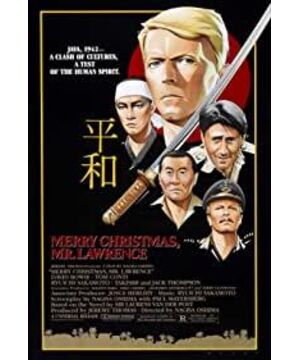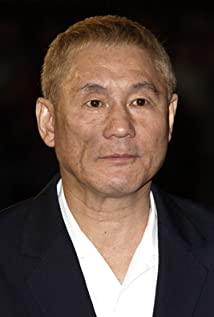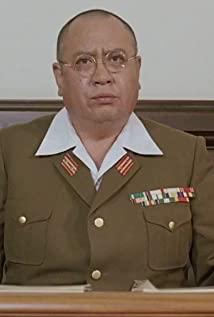After so long, I finally got the urge to write this movie review. The first time I knew that this movie was the soundtrack of Ryuichi Sakamoto, this song should be familiar to everyone. The episode of the movie completely transcends the movie itself, and Sakamoto Ryuichi feels a little guilty when he talks about it years later. But if you can put together David Bowie Oshima , Ryuichi Sakamoto, Takeshi Kitano, Tom Conti, the greatest artists of the 20th century, even if they are not great, they can be called classics.
This film not only talks about the emotions that cross gender, cross culture, and cross nationality in war, the film is more about the cognition and understanding of human nature in extraordinary times and different cultures, as well as the discussion of life and death, and responsibility.
Some people spend their entire lives repaying the "sins" they committed when they were young. This sin has been haunting in his heart like a ghost. So you can see that he has been tossing and restless all his life, because this restlessness allows him to find a way to release his inner lock. Jack Celliers, played by Bowie, is always on the battlefield trying to find the key to his redemption. British comrades gave Celliers the nickname "Strafer Jack". The performance of Celliers also matched the nickname given by his comrades, with a strong appearance and a will to fight like a machine gun that could never be fired. In fact, under Celliers' stubborn character, there is a restless specter. The specter came from a childhood betrayal of himself. When his younger brother with dwarfism was bullied by the whole school, Celliers, who had been protecting his younger brother since childhood, chose to remain silent for fear of being "stained" in his life, and chose to condone the collective attitude. reconciliation.
Opposite of Celliers is Captain Yonoi. Yonoi's eyes began to be blurred when he saw Celliers. Not only was he fascinated by Celliers' tall and handsome appearance, but Yonoi seemed to see an inexplicable "charm" in him. Although he couldn't say what it was. He was not dejected after being captured like other British soldiers, and even surrendered with dignity. Yonoi also has a "ghost" in his heart. The ghost came from the 226 coup in Japan. He even remembered that it was snowing that day. As a royalist faction, Yonoi was seized by the ruling faction who provoked a coup d'etat. Yonojing saw that his colleague was beheaded, but he chose to run away. Although he was spared the execution, there was a ghost in his heart, and his heart has never been stable.
Colonel Lawrence, a master of oriental culture, has traveled to Japan and Singapore before the war, and he also somewhat understands the way the oriental people handle things. So he can walk on both sides of Japanese and British prisoners. The Japanese soldiers also doted on the colonel, and the former sergeant played by Takeshi Kitano regarded him as a good friend who talked about everything. Sergeant Yuan was a staunch defender of the Bushido spirit, becoming a samurai at the age of 12 and dedicating himself to the emperor ever since. But Sergeant Yuan also has a role as a monk. He can recite sutras and often hang a string of beads around his neck. The former sergeant is caught between personal good and collective evil. Sometimes he didn't know what to choose, and he would ask Lawrence tentatively.
The conversation in the dark
The former sergeant asked: Lawrence, why are you still alive? I would admire you even more if you committed suicide. How could an officer like you endure such a humiliation.
Lawrence: In our concept, this is not a humiliation. Being a prisoner is also an experience and an asset in war. This camp is not the end, we will not commit suicide, suicide is a coward's way of escape.
In Japanese culture, life cannot have any stains, which is the collective will given by culture and society. But apart from the collective, everyone understands who can live without any stains? The mark of an immature man is his willingness to die heroically for a cause, and the mark of a mature man is his willingness to live humbly for a cause. Lawrence and the British prisoners of war with him belonged to the latter group. They know that life in a prisoner of war camp is just a segment of life experience. Life is not a straight upward development, but ups and downs, even big ups and downs.
There are many times in the film where Eastern rules and Western principles collide. In the trial court where Celliers is being tried, Yonoi can use his connections to save Celliers, who is sentenced to death. The former sergeant could attribute the death of a soldier who committed suicide by heroic sacrifice, so that his widow could receive a pension from the emperor. When dealing with soldiers who committed suicide by cutting their abdomens, Japanese culture requires all to fast, which is a rule to respect the deceased, while the British soldiers think about singing and lighting candles for the deceased. Facing the uncooperative British troops, Yonoi asked Lawrence loudly, am I doing the right thing? Lawrence, the British colonel who has been immersed in Eastern culture for many years, can't answer who is right and who is wrong.
Yonoi and Sergeant Yuan, who represent oriental culture, are on the surface and behind the scenes. Yonoi's preference for Celliers allows him to walk around while fasting, and even go to the Japanese military camp to get steamed buns. It's just that Celliers didn't appreciate it this time. He always did something out of the ordinary (stealing the radio), which made Yonoi overwhelmed. On the surface, everyone obeys the collective will, but behind the scenes they have their own calculus. Lawrence, who thinks he knows the rules of the Eastern game, silently said that I still don't understand them (Japanese) when he was made a scapegoat. In this environment, the belief in victory and the sense of crisis are overwhelming, because the slightest individual carelessness will cost his life. Therefore, in this case, people will become more selfish, the individual will will be put aside, and the individual will become a vassal of the collective will. Sergeant Yuan saw it very clearly. He saw both human nature and the "rules". So on Christmas night, the former sergeant used the wine to put the whole thing on the other captive. The next day, I sang a double-reed show with my leader, and the matter ended like this. Shinoi gave Sergeant Yuan a cigarette as a reward. He also lit a cigarette if he didn't smoke, and a stone was in his heart. finally landed. I'am told it is the japanese way to lie. Even the upright British captain saw through the truth that human nature is real and the rules are fake. It's just that reasonable rules need to be used to cover up human nature in such extraordinary times.
Yonoi began to wander between human nature and collective correctness. You start to wonder, you wonder if this collective oppression of humanity is right. Of course you also doubt your doubts, you doubt whether you should still hold on to your beliefs. In that moment, Celliers finally washed away the stains he had carried since childhood - this time he stood up bravely, standing on the other side of the crazy crowd and the collective consciousness. He has been waiting for this moment from beginning to end, waiting for the moment when humanity illuminates the darkness. People cannot always live in the shadow of their past.
Lawrence and Sergeant Yuan met again on the same island, but this time their identities were changed. The former sergeant became a prisoner of war, and Lawrence became the victor of the war. Sergeant Yuan also deliberately studied English for this meeting. He couldn't figure out why he was the one who was executed because he had committed the same crime as other soldiers. This goes back to the question of the choice between collective interests and individual interests, only this time it was the British who tried the Japanese, and the results of the trials were the same.
Every time I experience something, this piece of music by Ryuichi Sakamoto comes to mind naturally. The piano prelude seemed to be in love with each other at the beginning, but they were afraid of being known by others. The two tried each other to reveal some of their careful thoughts. The crisp percussion of the wood board runs through the harmony in the second half, the only sound that maintains its own rhythm among the neat and uniform melody played by other instruments, like a little bit of humanity squeezed out of the chaos. In line with any kind of tone, but maintains its own unique crisp sound. Human nature is like a flower that grows out of a stone crevice. You will feel that the flower is very beautiful, because you know that the growth of this flower is not easy.
View more about Merry Christmas Mr. Lawrence reviews











